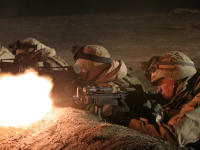What it also is, interestingly enough, is an effective allegory about war and political turmoil, taking on serious issues through the lens of space-faring and robot-fighting, in the grand sci-fi tradition. This season's early episodes depicted a group of people trapped in enemy territory, fleeing from the evil robotic Cylons as tensions within their little unit mounted. Galactica isn't afraid to show characters dying, or to depict the unexpected situations that soldiers can be thrown into ("I just joined to pay for dental school," laughs one inexperienced fighter in a recent episode). Off the battlefield, the show gets into politics, depicting a military coup, an imprisoned president and a democracy in peril. It's got a war-time leader who keeps the press in the dark and detains civilians indefinitely under suspicion that they might secretly be working for the government's enemies. Sound familiar?
 Contrast that with the new FX show Over There (Wednesdays, 10 p.m.), the first three episodes of which I watched to write about it in my TV column for Las Vegas Weekly. While Galactica gets glowing reviews and high ratings but not that much mainstream attention, Over There has been covered extensively in the months leading to its debut, and not just by TV critics. The first TV show to ever depict a current war, Over There follows a unit of U.S. soldiers in Iraq. It tackles head-on the issues that Galactica only depicts analogously, but does so in a much less subtle, more predictable and cliched manner. The characters on Over There are almost all stock war-movie stereotypes, and the plots are often clumsy and pretentious. Over There makes such an effort to depict U.S. soldiers favorably and to sidestep any political statements that its sensitivity can get in the way of its storytelling.
Contrast that with the new FX show Over There (Wednesdays, 10 p.m.), the first three episodes of which I watched to write about it in my TV column for Las Vegas Weekly. While Galactica gets glowing reviews and high ratings but not that much mainstream attention, Over There has been covered extensively in the months leading to its debut, and not just by TV critics. The first TV show to ever depict a current war, Over There follows a unit of U.S. soldiers in Iraq. It tackles head-on the issues that Galactica only depicts analogously, but does so in a much less subtle, more predictable and cliched manner. The characters on Over There are almost all stock war-movie stereotypes, and the plots are often clumsy and pretentious. Over There makes such an effort to depict U.S. soldiers favorably and to sidestep any political statements that its sensitivity can get in the way of its storytelling.Since it has gotten such attention and has been under such scrutiny, Over There has to be very careful in the way it tells its stories and paints its characters. As a result, it's a show that brazenly takes on a controversial topic but does so in a very safe, unadventurous way. Galactica, on the other hand, has the luxury of all sci-fi, which is that anything potentially offensive (to any political or social group) can be easily explained away as fiction, taking place in a far-flung time and a far-flung place. Ironically, the best way to depict such a volatile subject as the current war and political climate is not to portray it directly, but to couch it in an allegory that not only makes stronger statements, but also makes for much better drama.
No comments:
Post a Comment